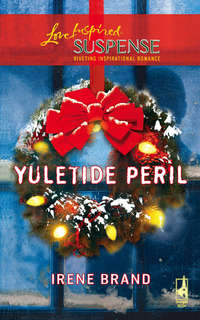
Полная версия
Second Chance at Love
Chase had been visiting with Allen Chambers when Amelia left the gym, and she’d hoped to escape talking to him tonight. Instead of going to the cubbyhole she’d be sharing with Vicky, Amelia followed the signs to the chapel, a small room with an altar, a lectern, a few pews and an illuminated cross in the background that dimly lit the room. She knelt by the altar to pray, but words were hard to find. She did pray for the flood victims, asking for strength and wisdom to make a difference in their lives. Since she didn’t know how to pray about Chase, she simply asked for guidance in every aspect of her life during these weeks she’d be spending in the mountains.
When she rose from her knees, Amelia had the sensation that she wasn’t alone. She turned quickly.
Chase leaned gracefully against the doorframe. His stunning good looks captured her attention as if she was seeing him for the first time. He’d changed from the shorts he’d worn earlier. His tailored brown slacks revealed a lean, sinewy, youthful body. His waist and hips were thin, but his broad shoulders stretched the fabric of his brightly colored shirt, which emphasized the gold flecks in his gray eyes. Chase had always looked well put together, like a male model.
“I didn’t mean to startle you,” he apologized. “Maybe this is a good place for us to talk?” He spoke hesitantly, as if he doubted his welcome.
Amelia’s head swirled with doubts, and she experienced momentary panic, but she didn’t want him to know her feelings. “Why not? It’s quiet here,” she said calmly.
“Looks like a good place to me,” he agreed.
They sat on the front pew, not close, but in comfortable conversing distance. Several minutes passed in tense silence, each of them waiting for the other to speak. What could they say to bridge fifteen years?
“The Amelia Stone I knew wouldn’t be praying in a chapel,” Chase said at last. In the dim light, his gray eyes seemed dark and unfathomable.
“Thanks to God, that Amelia Stone is gone.” She seemed to be in a Scripture-quoting mood today, Amelia thought humorously as she continued. “‘If anyone is in Christ, he is a new creation, the old has gone, the new has come!’ Vicky tells me that you’re a member of her church, so you’re probably familiar with that verse.”
“Yes. It’s true for me, too. I’ve been a Christian for several years.”
“Then neither of us is the person we used to be, which is for the best, I think.”
“What are you doing now, Amelia? I never meant to lose track of you, but the years passed quickly.”
“I’d had enough of being a rich man’s kid, so I left home to make it on my own. I wanted a job that would make a difference in other people’s lives, so I went to work for the Red Cross in Philadelphia. I’ve been there for several years. My parents never did have much time for me, so I’m pretty much on my own.” She scanned his face briefly. “Now it’s your turn.”
“I’m working at a bank in Worthington, Ohio. I transferred there from Chicago twelve years ago.”
She took a deep breath and plunged into chancy territory. “I assume you’re married?”
“No, I haven’t married.”
A tremor touched her lips and, hoping he hadn’t noticed, she changed the subject. “How long are you going to be here in Mingo County?” Amelia asked.
He paused thoughtfully, before he answered. “I’d only intended to unload our truck and go back home, but if I can arrange to take some of my vacation now, I might stay for a few weeks. I didn’t realize the extent of the disaster until I got here.”
“Neither did I. I want to help as much as possible, and I need some rest. It’s been a long day.”
Uncomfortable with the knowledge that Chase might extend his stay, Amelia stood and headed toward the door. She’d be more comfortable emotionally if he went back to Ohio. Was he really concerned about the flood victims, or was he staying because of her?
Chase walked alongside her to the door of her sleeping quarters. “My buddy and I are in the room next door,” he said. “If you need anything, pound on the wall, and I’ll hear you.”
“Thanks. See you in the morning.”
Chase walked into his room, thankful that his friend from the church was already sleeping. He undressed quietly, turned off the light and lay on the cot, wide-eyed. He’d been awake for almost twenty-four hours. He should be ready to sleep, but he couldn’t stop thinking about Amelia. Memories of the past plagued his mind. He remembered much about their time together—memories he’d be better off forgetting. Seeing what Amelia had become, he realized anew what a big mistake he’d made when he’d let her slip out of his life.
He stirred uneasily on the cot, a very uncomfortable place to sleep, but that wasn’t the cause of his distress. His marriage to Amelia had lasted for almost five years, and he kept remembering the intimate moments they’d shared. He was even more restless when he remembered the reason for their divorce, and who was to blame.
Amelia awakened sluggishly, her befuddled mind hazily questioning why she was sleeping on a board instead of her comfortable mattress. She stretched, turned over and barely missed tumbling off the narrow cot onto the floor. Her eyes popped open as reality surfaced. She was in a disaster area of West Virginia, not her Philadelphia apartment.
Cloud-darkened daylight crept into the schoolroom where she slept in the company of Vicky, who had abandoned her narrow bed and was curled up, kittenlike, on the floor with a yellow blanket wrapped around her. Rubbing the crick in her neck and her aching back muscles, Amelia thought the floor might have been preferable to the cot.
Amelia stifled her moment of self-pity, remembering that many people on the first floor of the building not only didn’t have a comfortable bed, but no home to put one in. Moving quietly so she wouldn’t disturb Vicky, Amelia stood, stretched her stiff muscles and went to the bathroom. Allen Chambers had mentioned last night that there was a shower room adjacent to the gymnasium, but Amelia knew the disaster victims would need that facility. She took a skimpy sponge bath with water from the lavatory.
She dressed in heavy socks, jeans, a pullover sweater and the knee-high waterproof boots her supervisor had insisted that she must have. Even though it was late April, this mountainous area was cold.
Pastor Chambers had mentioned that the church women would be serving breakfast at seven o’clock. When Amelia finished dressing, it was half-past six. She called Vicky’s name quietly, and the girl awakened immediately, seemingly none the worse for sleeping on the floor all night. Youth! Amelia thought enviously, when she compared the young woman’s bright and cheery attitude to her own low spirits. She doubted, though, that the uncomfortable cot was the only cause of her wretchedness this morning.
Amelia was usually more peppy upon awakening, and she knew that her exhaustion resulted from mental—rather than physical—fatigue. She hadn’t rested physically, because an overburdened mind had contributed to her restless night. Why had running into Chase caused her so much misery? She’d occasionally wondered how seeing him again would affect her. She’d never expected to experience the devastating anguish that had seared her heart the moment she had seen her ex-husband yesterday.
Memories of the past smothered Amelia, and she called to Vicky, who was still in the bathroom. “I’m going out for some fresh air. I’ll meet you in the gym.”
Leaving by the front door of the church, Amelia walked to the crest of the hill and looked out over the river valley. Below her, a two-lane highway, far above the river, provided some transportation. No trains moved along the railroad track at the base of the mountain, because the tracks were blocked by a floodwall gate. The Tug Fork River, the border between West Virginia and Kentucky, lapped several feet on the wall that protected the town of Williamson.
Remembering the devastation she’d seen from the helicopter, Amelia’s faith faltered momentarily. Why did God allow such destruction? She considered the apostle Paul and the many terrible things that happened to him. His faith had remained steadfast during all of his trials. Why bad things happen to good people was a question she’d never been able to answer.
Amelia hadn’t volunteered for this mission to ask questions. She was here to help troubled people, and she had to put aside her spiritual doubts and personal turmoil. Wondering what her duties would be today, Amelia turned back toward the church, praying that God would use her to make a difference in the lives of the flood victims.
After breakfast, Rick Smith stood on a small platform and called for their attention.
“I want to thank all of you volunteers for your prompt response to our needs. I’ve lived in this area all of my life, and I’ll quickly give you a brief rundown on our history. The first settlers arrived in the late eighteenth century, but the town of Williamson was organized a hundred years later. The heyday of our town was during the early twentieth century. Our population today is about five thousand, half of what it was a century ago. Many of our historic buildings were destroyed by frequent floods before we had floodwall protection, and many were razed to make room for the floodwall. Although it’s not what it used to be, Williamson is still a good place to live, and I hope you’ll feel welcome in the area.
“Today’s most urgent need is to find out how many people need help and to provide as much comfort as possible until more volunteers and supplies arrive.
“As soon as the roads are passable, several out-of-state churches will send portable kitchens and a staff to operate them,” he said. “They’ll do the cooking in a few central places, and our volunteers will take the food to the disaster areas. Today we need to canvas all of the flooded areas we can reach, see what the needs are and help as many people as we can. We can’t provide hot food today, but Chase and his buddy brought a lot of canned juice, water and snacks.”
“How long will it be before we can reach all the flooded areas?” a volunteer asked.
“The floodwaters are receding now, but representatives of the U.S. Corps of Engineers say that it will be weeks before we can drive into all of the affected areas. A lot of infrastructure has been destroyed. Go today prepared to hike into areas where the roads are impassable.”
“When will more Red Cross volunteers arrive?” someone in the crowd asked.
Rick Smith shook his head. “I don’t know. The National Guard brought in a few, but their helicopters are busy rescuing stranded people now. There are several truckloads of supplies stalled at the highway rest stop near Beckley, waiting to be delivered. As soon as the roads are open, we’ll have hundreds of helpers. It will be several days before we can get all of our supplies, emergency vehicles and more volunteers. In the meantime, we’ll make do with what we have. Today, I’m assigning you in teams of two to go out and assess the needs and help where possible.”
Rick Smith answered several questions from the flood victims, who wanted to know when they could go home. Over five inches of rain had fallen on the area in a twelve-hour period, and many people had escaped the rapidly rising water with nothing more than the clothes they were wearing. Understandably, they were anxious about the possessions, pets and neighbors they’d had to leave behind.
After he compassionately explained that it might be days before the people could leave this temporary shelter, Rick Smith asked, “Have any of you volunteers ever driven a Jeep?”
Amelia hadn’t seen Chase all morning, and she was startled when his voice sounded close behind her.
“I did, during my four-year stint in the army. I probably haven’t forgotten how.”
Amelia was surprised to learn that Chase had been in the army. That had apparently happened after they’d broken up.
Another man indicated that he’d once owned a Jeep, and Rick Smith said, “Good. We’ve borrowed a couple of Jeeps from the National Guard until we can get our rental vehicles, so you guys can drive them and scout out some of the isolated hollows today.” His gaze scanned the few volunteers.
“Amelia, I see you’re dressed for outdoor work, so you go with Chase, and…”
Stunned by this turn of events, Amelia didn’t hear the rest of the assignments. She could not spend the day alone with Chase! Her erratic heartbeat almost took her breath away, and she became more uncomfortable as her dismay increased.
Rick had moved on with the daily plans, not giving Amelia the opportunity to accept or reject the assignment.
When Chase appeared at her side, saying quietly, “This will be like old times,” Amelia knew it was too late to politely refuse. Were her steps destined to travel a path that would disrupt the even current of life she’d developed in the post-Chase era, as she always thought of the last fifteen years?
The eagerness in Chase’s clear gray eyes was disconcerting, and she forced herself to regard him dispassionately, as she might look at a stranger. Amelia considered the man facing her was a stranger. Very little that she’d noted in the short time they’d spent together yesterday had reminded her of the man who’d loved her, married her and disillusioned her so thoroughly that she had no interest in marrying again.
Chapter Three
Amelia decided to accept the inevitable. She wouldn’t be able to avoid contact with Chase, but she was determined to prevent him from hurting her again.
“While you load provisions in the Jeep, I’ll bring my laptop,” she said, praying that her casual tone would convince Chase that he was no more to her than a business acquaintance. Which was true, wasn’t it? “I can use the computer to record our findings,” she added.
Amelia went to her makeshift bedroom for the laptop and a hooded plastic parka, because more rain was predicted today. She filled a tote bag with personal items she might need.
Seated in a camouflaged Jeep, Chase waited in front of the church, and he handed her a white Disaster Relief vest with a red band around the bottom and a large red cross on the back. “We have to wear these all the time when we’re out on a volunteer mission.”
The Jeep didn’t have any doors, just a fabric roof, so Amelia climbed in beside Chase and adjusted the seat belt. She removed a woolen cloche from her tote and put it on her head. She pitched the tote into the back seat, opened her laptop, steadying it on her knees.
“Let’s go,” she said.
How could a man wearing a heavy woolen jacket, jeans, a pair of rubber boots and a hat covered with plastic appear attractive? On Chase, the work clothes lent an air of masculinity that enhanced his handsome features.
Thunder sounded in the distance and a few sprinkles accumulated on the windshield.
“It was a good idea to bring your parka. I have a raincoat on the back seat if I need it,” he said.
Chase nosed the Jeep toward the edge of the mountain and down the steep incline toward the river valley. After driving a few miles eastward on the paved highway, he turned left on a narrow, rutted, muddy road, and shifted into four-wheel drive. Red clay mud flew in all directions as, with difficulty, he maneuvered the Jeep upward along the hazardous mountain terrain.
“Are you sure this is the right road?” Amelia said as she clutched the seat with both hands.
“I’m beginning to wonder. Rick Smith said to take the first road to the left, but this must not have been the one he meant.” Glancing over his shoulder at the steep, crooked road, he said, “I can’t go back now.”
The road wound up and down and around the mountain, and within fifteen minutes, sweat dripped from Chase’s forehead into his eyes. Knowing he didn’t dare take his hands from the steering wheel, Amelia held on with one hand and took a handful of tissues from her pocket. She wiped the moisture from his face. Her fingers tingled when they brushed the day-old stubble of his whiskers, reminding her of the days when she’d awakened at his side, her smooth face resting against his scratchy one.
“Thanks,” he said.
His words stuck in his throat as they entered a sharp dip and the front wheels of the Jeep dropped into a demolished culvert. The decline was so sudden that, in spite of her seat belt, Amelia’s body bounced forward and her head hit the windshield.
“Ouch!” she said.
Struggling to pull the Jeep out of the gaping ditch, Chase couldn’t spare her a glance, but he asked quickly, “Are you hurt?”
“Not much. Don’t worry about me. Just get out of the ditch. I’d hate to be stranded up here.”
In an attempt to control the twisting and turning vehicle as it writhed like a serpent in the sticky, reddish mud, Chase gunned the engine and gripped the steering wheel until his knuckles whitened. When he maneuvered the Jeep to level ground, Chase stopped and lowered his head on the wheel, his shoulders heaving as he struggled for breath.
“I don’t know if I can take much more of this. I’ve never driven on such a road.”
“Road? This isn’t a road—it’s a disaster!” Amelia took a small bottle of water from her tote. “Want a drink?”
“And how!” Chase said. He unscrewed the lid and gulped more than half of the water. “I don’t know what to do now, but I guess we’ll keep going forward—it couldn’t be any worse than retracing our route.”
“I shouldn’t think so,” Amelia agreed.
Shifting into gear, Chase said, “Talk to me while I drive. You’re too quiet.”
Torn by conflicting emotions, Amelia chose her words carefully. “This road has scared me silent, and I don’t know what to say to you, anyway. Maybe you haven’t been upset by our surprise reunion, but it’s been awkward for me. I don’t want to talk about the past, and this flood disaster isn’t a pleasant subject.”
“Then talk about your parents. How are they?”
“I don’t see much of them. You know that Mother and Dad had been married ten years when I was born, and they’d already molded their marriage without a child. When I went home after our divorce, Mother insisted that I move into my own apartment. I assumed that a divorced daughter was an embarrassment to them, that their friends would think they hadn’t guided me correctly. Since I didn’t think they’d want me living in the same town, I moved out of state. After Dad retired, they sold their holdings in Illinois and moved to Hilton Head permanently. I never did fit into their plans. I used to resent that, but I’ve gotten over it.”
As she continued, Chase wondered if she had come to terms with her parents’ neglect.
“To make up for their lack of devotion, they offered to give me a generous monthly allowance to cover all my needs. They didn’t like it when I got a job. I convinced them that I can make it on my own, but they still shower me with gifts. They bought a new Buick, which I didn’t want, for Christmas. I make enough money to buy a car when I need one, but I was perfectly satisfied with my five-year-old Volkswagen.”
Her parents had liked Chase and, without knowing the circumstances, had blamed Amelia for the divorce. She’d remained silent, letting them believe what they wanted to. On the other hand, Chase’s parents had always resented Amelia, and were pleased when he, in their words, “got rid of her.”
In spite of his preoccupation with the difficult driving, Chase remembered that Amelia’s parents had bought costly, and often inappropriate, gifts for her birthday and Christmas, but that hadn’t compensated for the lack of their presence. After they’d spent thousands of dollars to give Amelia a lavish wedding, they seemed to think they’d done their duty by her. They occasionally stopped to see Amelia and Chase, but only for brief visits on their way to business conferences or frequent vacations. The Stones took a cruise each Christmas, and Amelia had spent few holidays with her parents after graduating from high school. And since his parents didn’t like Amelia, Chase hadn’t gone home for holidays, either, until after their divorce.
After a mile or two of torturous travel, the mountain road dipped into a hollow and joined a graveled road along a creek. Only a scant amount of water remained on the road, but the creek was still bank-full. Abandoned railroad tracks lay along the bank of the stream. Evidence of disaster was everywhere. The floodwaters had covered housetops, and rain-soaked curtains drooped drearily from open windows that had been broken by the swift current. Chain-link fences had been torn out by the deadly torrent, the metal twisted together and dumped in mutilated heaps beside the creek bed.
As they drove slowly upstream, Chase said worriedly, “I wonder if I took the wrong road. Rick said there was a town up this hollow.”
“If so, the residents might have perished in the flood. Not many people could have survived this deluge,” Amelia said.
They reached a spot where the strong water had stripped off the surface of the road, and Chase braked abruptly. For several yards, only two or three feet of roadbed separated two yawning ditches filled with pieces of pavement and foul-smelling water. A sharp curve blocked their view of what lay before them.
“Looks like the end of the road. I’ll walk for a mile or so to see if I can find any survivors,” Chase said.
Amelia unlocked her seat belt and stepped out of the vehicle into an inch of water on the roadbed.
“You don’t have to go,” Chase protested.
“This is a joint venture,” she replied. “I’ll do my part.”
Shifting the Jeep into Reverse, Chase backed up cautiously until he found a place wide enough to turn the vehicle. Although it hadn’t started raining yet, the clouds looked ominous, and he wanted to be headed out of this hollow if there was another cloudburst. He pocketed the keys, adjusted a heavy pack filled with food and first-aid supplies over his back. He hurried to join Amelia, who’d already crossed the narrow pathway and waited for him.
In places, they walked through water, and Amelia was thankful for her heavy boots. After they’d journeyed about a mile, Chase suggested that they turn around, but Amelia pointed to a spiral of smoke ahead of them. She was already tired from the unfamiliar exertion, but her steps quickened. She was both eager and fearful to learn the condition of the town’s residents.
After rounding another bend in the road, they climbed a small hill and saw several buildings scattered haphazardly at the head of the hollow. Some houses had been washed off their foundations, outbuildings were now piles of shattered wood, tops of automobiles projected from the creek, a thick layer of black mud covered the ground, plastic bottles and other debris hung from tree branches. Chase pointed at a ramshackle mine shaft and tipple on the mountainside behind the houses.
“According to Rick Smith,” he said, “this used to be a coal town, but the mine was abandoned several years ago. The coal company let the people buy their houses at a reasonable cost.”
Amazingly, a debris-covered bridge still straddled the stream, but water lapped at the wooden floor. Chase tested the stability of the bridge by taking a few uncertain steps on the wet surface.
“Careful!” Amelia cautioned him, holding her breath.
“It’s safe enough,” Chase said, and he took Amelia’s hand and held it tightly as they crossed the wobbly structure.
They sank ankle-deep into the black mud that sucked at their feet as they walked up the town’s one street. Layers of mud and trash covered the ground. Cars were tangled in a net of mud and dead trees. Except for the swirling echoes of the still-swollen stream, a deadly silence greeted them. A few dwellings had collapsed under the force of the water, which had also forced doors and windows open on the remaining houses.
“Anybody home?” Chase called several times.
At first, the town seemed deserted, until they heard the faint sound of music. Momentarily, Amelia and Chase stared at one another in amazement, before they broke into a run, following the curve of the street. Disbelieving, they stopped in their tracks.








